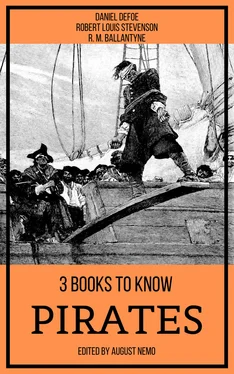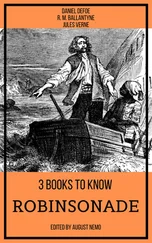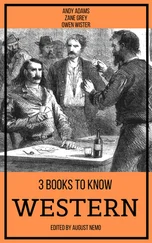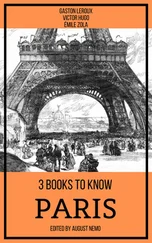The sight that met our gaze was certainly not a little amusing. On the top of a log which we sometimes used as a table sat the black cat with a very demure expression on its countenance, and in front of it, sitting on the ground with his legs extended on either side of the log, was Peterkin. At the moment we saw him he was gazing intently into the cat’s face, with his nose about four inches from it, his hands being thrust into his breeches pockets.
“Cat,” said Peterkin, turning his head a little on one side, “I love you!”
There was a pause, as if Peterkin awaited a reply to this affectionate declaration. But the cat said nothing.
“Do you hear me?” cried Peterkin sharply. “I love you — I do! Don’t you love me?”
To this touching appeal the cat said “mew” faintly.
“Ah, that’s right! You’re a jolly old rascal! Why did you not speak at once, eh?” and Peterkin put forward his mouth and kissed the cat on the nose!
“Yes,” continued Peterkin after a pause, “I love you. D’you think I’d say so if I didn’t, you black villain? I love you because I’ve got to take care of you, and to look after you, and to think about you, and to see that you don’t die —”
“Mew, me-a-w!” said the cat.
“Very good,” continued Peterkin; “quite true, I have no doubt. But you’ve no right to interrupt me, sir. Hold your tongue till I have done speaking. Moreover, cat, I love you because you came to me the first time you ever saw me, and didn’t seem to be afraid, and appeared to be fond of me, though you didn’t know that I wasn’t going to kill you. Now that was brave, that was bold, and very jolly, old boy, and I love you for it — I do!”
Again there was a pause of a few minutes, during which the cat looked placid, and Peterkin dropped his eyes upon its toes as if in contemplation. Suddenly he looked up.
“Well, cat, what are you thinking about now? Won’t speak, eh? Now tell me: don’t you think it’s a monstrous shame that those two scoundrels, Jack and Ralph, should keep us waiting for our supper so long?”
Here the cat arose, put up its back and stretched itself, yawned slightly, and licked the point of Peterkin’s nose!
“Just so, old boy; you’re a clever fellow. — I really do believe the brute understands me!” said Peterkin, while a broad grin overspread his face as he drew back and surveyed the cat.
At this point Jack burst into a loud fit of laughter. The cat uttered an angry fuff and fled, while Peterkin sprang up and exclaimed:
“Bad luck to you, Jack! You’ve nearly made the heart jump out of my body, you have!”
“Perhaps I have,” replied Jack, laughing, as we entered the bower; “but as I don’t intend to keep you or the cat any longer from your supper, I hope that you’ll both forgive me.”
Peterkin endeavoured to turn this affair off with a laugh. But I observed that he blushed very deeply at the time we discovered ourselves, and he did not seem to relish any allusion to the subject afterwards; so we refrained from remarking on it ever after, though it tickled us not a little at the time.
After supper we retired to rest, and to dream of wonderful adventures in our little boat and distant voyages upon the sea.

THE BOAT LAUNCHED — We Visit the Coral Reef — The Great Breaker that Never Goes Down — Coral Insects — The Way in which Coral Islands are Made — The Boats Sail — We Tax Our Ingenuity to Form Fish-Hooks — Some of the Fish We Saw — And a Monstrous Whale — Wonderful Shower of Little Fish — Waterspouts.
––––––––

IT WAS A BRIGHT, CLEAR, beautiful morning when we first launched our little boat and rowed out upon the placid waters of the lagoon. Not a breath of wind ruffled the surface of the deep. Not a cloud spotted the deep-blue sky. Not a sound that was discordant broke the stillness of the morning, although there were many sounds — sweet, tiny, and melodious — that mingled in the universal harmony of nature. The sun was just rising from the Pacific’s ample bosom, and tipping the mountain-tops with a red glow. The sea was shining like a sheet of glass, yet heaving with the long, deep swell that, all the world round, indicates the life of Ocean; and the bright seaweeds and the brilliant corals shone in the depths of that pellucid water, as we rowed over it, like rare and precious gems. Oh, it was a sight fitted to stir the soul of man to its profoundest depths! and if he owned a heart at all, to lift that heart in adoration and gratitude to the great Creator of this magnificent and glorious universe!
At first, in the strength of our delight, we rowed hither and thither without aim or object. But after the effervescence of our spirits was abated, we began to look about us and to consider what we should do.
“I vote that we row to the reef,” cried Peterkin.
“And I vote that we visit the islands within the lagoon,” said I.
“And I vote we do both,” cried Jack; “so pull away, boys!”
As I have already said, we had made four oars; but our boat was so small that only two were necessary. The extra pair were reserved in case any accident should happen to the others. It was therefore only needful that two of us should row, while the third steered by means of an oar — and relieved the rowers occasionally.
First we landed on one of the small islands and ran all over it, but saw nothing worthy of particular notice. Then we landed on a larger island, on which were growing a few cocoa-nut trees. Not having eaten anything that morning, we gathered a few of the nuts and breakfasted. After this we pulled straight out to sea, and landed on the coral reef.
This was indeed a novel and interesting sight to us. We had now been so long on shore that we had almost forgotten the appearance of breakers, for there were none within the lagoon. But now, as we stood beside the foam-crested billow of the open sea, all the enthusiasm of the sailor was awakened in our breasts; and as we gazed on the widespread ruin of that single magnificent breaker that burst in thunder at our feet, we forgot the Coral Island behind us, we forgot our bower and the calm repose of the scented woods, we forgot all that had passed during the last few months, and remembered nothing but the storms, the calms, the fresh breezes, and the surging billows of the open sea.
This huge, ceaseless breaker, to which I have so often alluded, was a much larger and more sublime object than we had at all imagined it to be. It rose many yards above the level of the sea, and could be seen approaching at some distance from the reef. Slowly and majestically it came on, acquiring greater volume and velocity as it advanced, until it assumed the form of a clear watery arch, which sparkled in the bright sun. On it came with resistless and solemn majesty, the upper edge lipped gently over, and it fell with a roar that seemed as though the heart of Ocean were broken in the crash of tumultuous water, while the foam-clad coral reef appeared to tremble beneath the mighty shock!
We gazed long and wonderingly at this great sight, and it was with difficulty we could tear ourselves away from it. As I have once before mentioned, this wave broke in many places over the reef and scattered some of its spray into the lagoon; but in most places the reef was sufficiently broad and elevated to receive and check its entire force. In many places the coral rocks were covered with vegetation — the beginning, as it appeared to us, of future islands. Thus, on this reef, we came to perceive how most of the small islands of those seas are formed. On one part we saw the spray of the breaker washing over the rocks, and millions of little, active, busy creatures continuing the work of building up this living rampart. At another place, which was just a little too high for the waves to wash over it, the coral insects were all dead; for we found that they never did their work above water. They had faithfully completed the mighty work which their Creator had given them to do, and they were now all dead. Again, in other spots the ceaseless lashing of the sea had broken the dead coral in pieces, and cast it up in the form of sand. Here sea-birds had alighted, little pieces of seaweed and stray bits of wood had been washed up, seeds of plants had been carried by the wind, and a few lovely blades of bright green had already sprung up, which, when they died, would increase the size and fertility of these emeralds of Ocean. At other places these islets had grown apace, and were shaded by one or two cocoa-nut trees, which grew literally in the sand, and were constantly washed by the ocean spray — yet, as I have before remarked, their fruit was most refreshing and sweet to our taste.
Читать дальше














